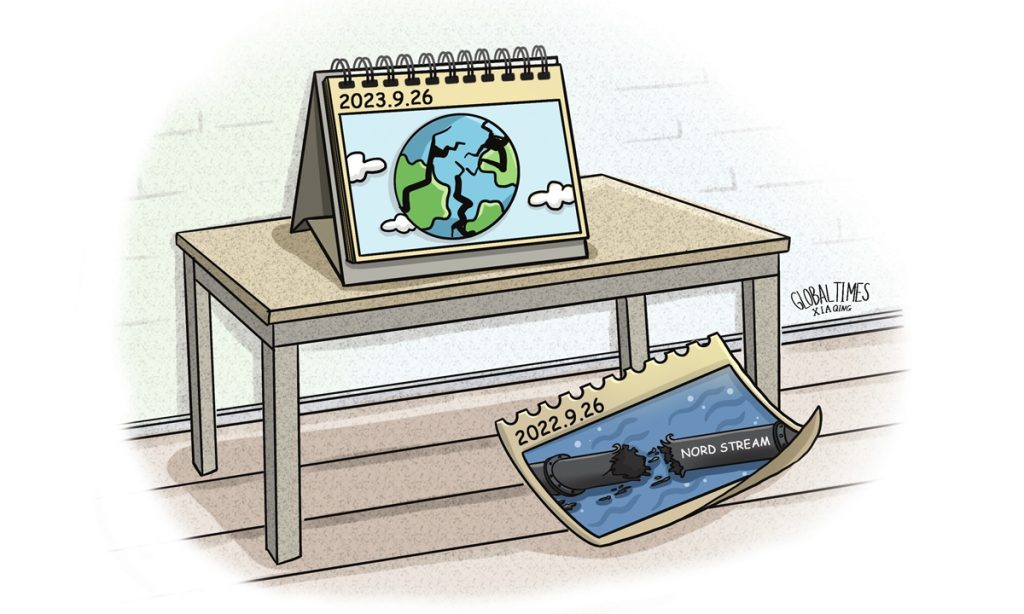Mystery, repercussions of Nord Stream pipeline explosions still linger one year later

The one-year anniversary of the unsolved Nord Stream explosions on September 26 is a timely occasion to reflect on one of the largest acts of sabotage in history and the broader geopolitical tensions within which it took place. Several underwater blasts destroyed most of the Nord Stream I and II pipelines that day. Russian gas exports to Germany through the first pipeline were already reduced by that time while the second never entered into operation.
After the sabotage, Russia and the West predictably blamed each other. Russia argued that the US had a self-interested hegemonic motive in blowing them up in order to undermine the crucial energy component of Russia-Germany relations in parallel with selling more expensive liquefied natural gas (LNG) to the EU. The West, meanwhile, couldn't formulate a cogent explanation for why Russia would blow up its own pipelines.
It wasn't until early February 2023 that some credible leads finally emerged regarding who was responsible. Pulitzer Prize-winning journalist Seymour Hersh published a detailed report on Substack citing what he described as unnamed Biden Administration officials who allegedly informed him that the US began preparing to destroy the Nord Stream pipelines last summer. The US denied the claims, after which the New York Times reported their own version of this story in early March. According to their unnamed sources, a rogue group of Ukrainians purportedly rented a yacht from Poland that they then used to move professional divers to the site to plant the underwater explosives that later thereafter blew up those pipelines. They were apparently motivated to asymmetrically attack Russia in response to its special operation despite their plans also harming the interests of NATO-member Germany, though many Ukrainians were annoyed with Berlin back then for not sending more arms.
It remains to be seen whether undeniable evidence will ever emerge and be shared with the public and prove who the guilty party is. Until then, one can only speculate about who was responsible, which is why it's more constructive to look at the consequences of this incident in the year since it happened.
Russia-Germany relations markedly deteriorated in the aftermath as Berlin finally agreed to dispatch heavy weapons to Ukraine. Europe no longer heavily relies on Russia for oil or gas, and this "decoupling" of their previously strong and strategic ties seems to have led to the continent losing all sense of restraint in this conflict. Almost every country, most of which are also NATO members, has since supplied Ukraine with plenty of arms.
As a result, Russia-EU relations as a whole deteriorated much further than before upon Russia's ties with Germany, the bloc's largest economy, deteriorating after the Nord Stream explosions. Meanwhile, relations with the US comprehensively strengthened, especially in the energy domain. Accordingly, American influence surged to levels last seen since the height of the Cold War or first few years after World War II.
These objectively existing outcomes extend credence to Russia's claims of US complicity in last year's incident, which if true, would amount to a de facto declaration of war against its own German NATO ally due to the military nature of what happened. The same also goes if Ukraine were responsible since it too had a motive seek these outcomes. In any case, Russia-Germany relations and especially Russian-EU relations since the start of the special operation decisively changed for the worse since that attack.
Bearing all this in mind, it can be said that the legacy of the Nord Stream explosions still lingers one year on, and will likely persist across the coming years due to its game-changing consequences. Any hopes of a Russia-Germany rapprochement and thus a Russian-EU rapprochement influenced by Berlin's energy interests, irrespective of conspiratorial speculation of a secret deal between them, were dashed. The EU then fell more fully under the US' influence, which intensified the NATO-Russian proxy war in Ukraine.
Considering that this outcome worsened that conflict, one can conclude that the continued civilian suffering in Ukraine is partially connected to this incident. Russia's setback in Kherson Region less than two months later in early November, and that which it experienced in Kharkov Region in early September just prior to the Nord Stream attacks, could have in theory provided a chance for Germany to mediate a ceasefire if it was still motivated by the desire to resume gas transit.
That's not to suggest that it was secretly conspiring with Russia about this before the incident happened, but just that Russia's subsequent setback in the Kharkov Region at the onset of winter might have inspired Germany policymakers to independently explore this possibility if the Nord Stream pipelines were intact. Alas, their destruction led to the preceding hopes being nothing but a thought exercise, though it's still worthwhile wondering in terms of the bigger picture on the one-year anniversary of that attack.